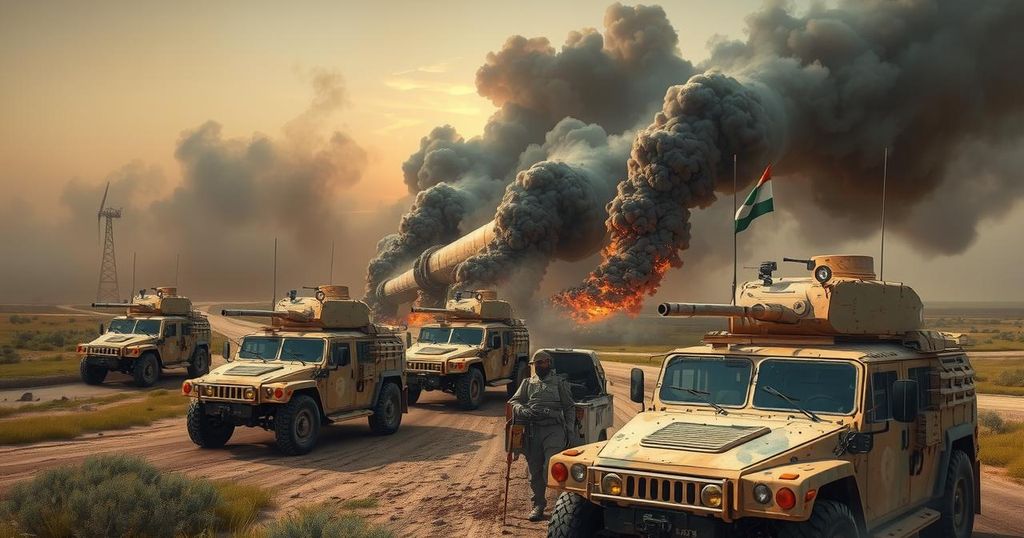Russian troops employed a gas pipeline for a surprise attack on Ukrainian forces in Kursk, while Ukraine’s President Zelensky emphasizes a commitment to peace negotiations with the U.S. Amidst this, France plans to fund military support using Russian assets, and concerns arise over U.S. military aid cuts to Ukraine, prompting calls for reinforced European defense commitments.
Recent reports indicate that Russian troops launched a surprise attack on Ukrainian forces in the Kursk region, utilizing a gas pipeline as a means of approach. Pro-Russian military blogger Yuri Podolyaka highlighted that some special forces had hidden within the pipeline for several days, setting the stage for the offensive near Sudzha. This attack follows prior attempts by Ukraine to secure approximately 1,300 square kilometers of Kursk territory in August for leverage in negotiations against Russia.
Ukrainian President Volodymyr Zelensky expressed Ukraine’s unwavering commitment to peaceful resolutions ahead of his upcoming meetings with U.S. officials in Saudi Arabia. He stated, “Ukraine has been seeking peace from the very first second of this war… The key is to move quickly and effectively.” Zelensky plans to discuss next steps with the U.S. leaders, anticipating productive dialogue following a meeting with Crown Prince Mohammed bin Salman.
French Armed Forces Minister Sebastien Lecornu announced plans to allocate an additional €195 million in weapons funding for Ukraine, utilizing interest generated from Russian assets. In a recent interview, Lecornu outlined the intention to supply artillery shells and glide bombs for Mirage 2000 fighter jets, along with older armored vehicles. This funding is part of the broader $50 billion commitment from the Group of Seven nations, utilizing returns from frozen Russian assets.
Shadow Home Secretary Chris Philp articulated significant concern regarding the cessation of U.S. military aid and intelligence-sharing to Ukraine, labeling the suspension as “deeply concerning.” He emphasized the need for the U.K. to continue robust support to Ukraine, highlighting the permanence of Russia’s threats and the importance of solidarity during such crises. Philp urged constant military and intelligence support, advocating against Russian aggression.
A Ukrainian drone attack targeted an industrial facility in the Chuvashia region of Russia, further exemplifying the ongoing conflict’s reach. Chuvashia’s Governor Oleg Nikolayev reported no casualties at the Kombinat Burevestnik facility. This incident reflects a series of escalated drone assaults deep into Russian territory, with unverified reports mentioning attacks on oil refineries in Ryazan and Lipetsk.
Former Deputy Prime Minister Lord Michael Heseltine has called for a significant reassessment of defense and security strategies post-Brexit in light of recent U.S. policy shifts. In his opinion piece, he argues for a potential new European military command structure to bolster the continent’s defenses, citing the risks posed by evolving geopolitical tensions and the implications of Donald Trump’s actions.
Latvian President Edgars Rinkevics urged European nations to adopt conscription and increase defense spending to address military vulnerabilities. Rinkevics highlighted Latvia’s own implementation of conscription and encouraged other countries to strengthen their military responses amid shifting dynamics with the U.S.
The Russian Defense Ministry confirmed the capture of the village of Konstyantynopil in Ukraine’s Donetsk region, with claims of retaking Lebedevka in the Kursk area. These developments signal the ongoing volatility of territorial control in Eastern Europe, emphasizing the strategic significance of these regions in the broader conflict.
Chancellor of the Duchy of Lancaster Pat McFadden remarked that nations cannot be compelled into collaboration but must willingly support coalitions formed for mutual defense. He reiterated the U.K.’s proactive role in international discussions on the matter, while Cabinet Office Minister Pat McFadden refrained from commenting on U.S. decisions regarding intelligence sharing with Ukraine, reinforcing the ongoing commitment to support Ukrainian sovereignty.
In summary, the recent military activities surrounding the Ukraine-Russia conflict reveal escalating tensions and shifting strategies among nations. Notably, Russian forces are utilizing unconventional tactics while Ukraine seeks to engage diplomatically with key allies. Furthermore, significant military aid initiatives, particularly from France, and urgent calls for increased defense spending and conscription across Europe highlight the evolving geopolitical landscape that necessitates collaboration and support for Ukraine in the face of ongoing aggression.
Original Source: www.independent.co.uk




